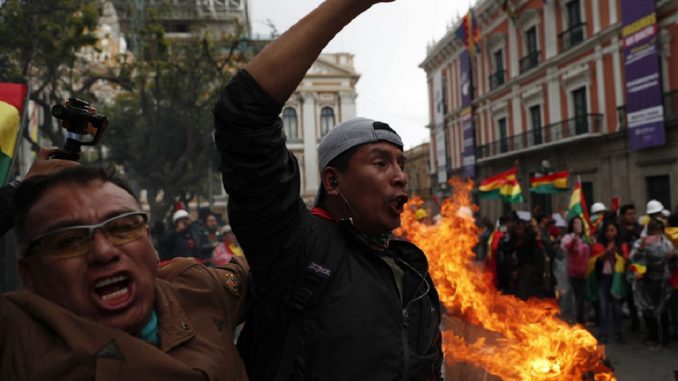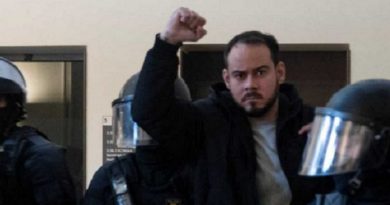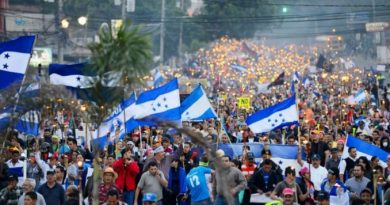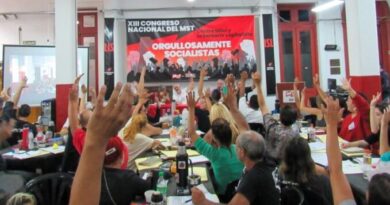Bolivia: between the coup and the covenant
Social discontent, allegations of fraud. Evo waiver request and out of the country. Proclamation of an illegitimate president and jump into the fight on the streets. Acuerdo entre el gobierno golpista y el MAS para elecciones sin Morales ni García Linera. What happens in Bolivia? What debates there? An independent position of the anti-capitalist and socialist left.
In a context of strong ascent and jump in the class struggle in Latin America, Bolivia broke into plan of a coup that was just, Evo Morales resignation by. Imperialism and its local partners saw an opportunity to bring about a change of course and in this way also discourage the rise that crosses the continent. Had in his favor the strong social discontent that have long suffered the government of the MAS, product not respond to social demands, have a policy of agreements with extractive corporations and entrepreneurs, bureaucratization and cooptation boost social organizations and finally pretend Evo reelection for the fourth time, after being rejected in a plebiscite. That combo was sapping their support bases and the most reactionary right there became visible with plans seeing that it was his time.
Social unrest, coming before, It was expressed during the first days of the coup, where important social sectors did not go to his defense. On this base, also we understand that the decision was wrong Evo Morales to leave the country, disbelieving the popular strength to face the coup and not resorting to the workers and peasant organizations to organize resistance and protect his own life. The argument to go to pacify and avoid a bloodbath does not withstand serious analysis. Since his departure there was blood, death and repression. Saving distances, It was a phenomenon similar to the output of Peron of Argentina before the coup the 55, who went with similar arguments and similar results, they paid the workers who led the resistance to the coup without their leader.
Senkata and mass heroism
The fight against the coup, from the time that the armed forces will demand the resignation of Morales, It became a centerpiece of policy. The emergence of a coup plan concocted by reactionary military and civilian sectors, under the tutelage of the US and the OAS, He placed the task of confronting this plan to defeat him, as a daily priority for the labor movement, indigenous and campesino. So we participated in various actions against the coup in our country.
As usual, in the most critical moments and major tensions, You see who's who. It is no coincidence that at the peak of greatest coup repression, the rich history of struggle of the Bolivian people has come to light in all its glory with flags as a symbol wiphalas. They emerged genuine mobilization of peasants and mining sectors, strikes, assemblies and councils of great representation, where thousands gathered to organize the struggle against the coup and to demand the resignation of Áñez. That social force, in which Morales did not trust leaving, He was felt at times like never putting on the ropes to the coup government.
In this heroic resistance it stands blocking plant hydrocarbons Senkata, where thousands were played to cut off supplies to the putschists and besiege La Paz, which depends exclusively on the fuel distribution that plant. For several days the site remained facing a bloody crackdown, after which thousands came to La Paz with their dead comrades leading the mobilization. Of these blocking actions, as others in Cochabamba, They emerged the best examples that gave rise to new councils involving various states. Setting the fastest time of the confrontation with the coup and noting that the coup leaders did not have all win.
Direct struggle pact
Contrasting with genuine working resistance, indigenous and campesino who unified the social base of Morales and thousands who remain critical to Evo wanted to defeat the coup, a new and serious political mistake of the leadership of the MAS was completed consummating. Instead of pushing back the struggle and organization to defeat Áñez and Camacho, They decided to go to the covenant, negotiation and common call, under explicit recognition of the government coup, new elections without Morales and Linera.
While on the streets confronting the coup he was gaining ground, the parallel negotiations that the weekend was voted opened a new political moment; the attempt to remove the anti-coup rise and show the world right next to an election re-established order; and the call to pacify the country that drive themselves MAS leaders calling for lifting shares, plus the majority leadership of the COB who met with the illegitimate government to support the roadmap, which it is a path of betrayals.
This route chosen by the direction of the MAS, besides having very uncertain future results, It was a brake and clearing anti blow just when most needed deepen. I will go down in history as the last MAS Bolivia capitulation after a long series of inconsistencies. For now, in different areas remains actions of resistance, reports of fierce repression and demand for justice. The process towards the elections will not be easy but of political and social instability, leaving open the prospects.
Reformism and posibilismo in the XXI century
In the twentieth century, different revolutionary processes were stopped first and then diverted, by political leaderships that adapt to the prevailing system without intending to change its entire political structure, economic and social. In the best case scenario they come to provide some social measures, make partial changes and constitutional reforms that make some progress without questioning the capitalist essence of the existing order. In general the political argument has been the lack of international conditions, absence of favorable terms of force or the existence of rights strengthened impeding progress. A string of justifications policy addresses that do not have anti-capitalism and socialism in its strategy.
Bolivia's Evo and Linera, emerged from the revolutions 2000-2003, He was not exempt from this same matrix problem. Since his inauguration, after social improvements, They took on in its draft government for a twenty-first century version of those reformers and possibilists conceptions that do not pass any test.
This policy is in theory a foundation by García Linera, recognized intellectual who has written and lectured around the world on these issues, explaining that they were building in Bolivia a new type of multinational state with different classes and a new economic model. Linera said in an interview: "While no community initiatives emerge from society, we have to work with what exists and these are entrepreneurs, they have to be strengthened, grow and generate more wealth. Take off that chip of when the government will give the coup and nationalize all. That's not going to happen, that has failed and that is not socialism '(1). so confused, bureaucratic atrocities of Stalinism with the urgent need to put all strategic springs Bolivia in the hands of the working class and the people, instead of promoting a policy of class conciliation wrong.
In another text he authored Linera added: "Once the branch point that radically restructures the balance of forces between social classes crossed, resulting in a new power bloc leader of society, again you have to re-articulate and convince the rest of society, even the opponents do not go away, although its articulation is no longer as dominant classes, but as classes defeated, that is to say, Disorganized without own project ... the formula is: and establish convincing ... in other words, defeating the dominant project and integrate around the new dominant moral and logical schemes to the rest of society. That is the formula of political hegemony, of the process of building the new state form. "(2)
In another written it refers to the kind of state building; "The social state is a process called formation process hegemonies or blocks class; that is to say, the ability of a historic block in its draft joint company, classes that are not part of that project leader "... can only work through the action of the whole society, with the participation of all social classes "(3).
The main theoretician of the Bolivian process to convince everyone believes in, to integrate all kinds to their State Building. Y created, mistakenly, as shown by the current coup, They defeated those classes will act in a disorganized and without project. Linera essentially leaves aside the Marxist concepts of the state, its class character and its obvious role of institution repressive institutions in the hands of capitalism, impossible to be convinced and need to be crushed and removed to build another transitional state, class and antagonistic to capitalist forces.
The ferocity of the putschist actions and the entire state apparatus and Lineras Morales had led until a few days before, It was a stroke of reality showed that the Bolivian capitalist state was still there, showing through the army, police and other institutions face their true class and bloody when they saw fit. Driven by leaders of entrepreneurs santacruceñas same forces that had not been persuaded in the construction of the State of all.
Evo said days ago that he regretted equipped army weapons now used against the people. And so the theory collapses with Linera advocates of trying to build a different state without changing the social bases, policies, military and institutional country. The laws of revolutions are concrete: or she is moved by the "October agenda"(4) to radical changes and defeat all the Bolivian bourgeois apparatus or this, no sooner had the chance, act. That second hypothesis, Regrettably, we are witnessing.
A new time, a new left
Bolivia opens new and old debates that delve into other items. For now, in everyday life it opens a new stage in the struggle of the Bolivian people. From the MST and continue LIS available to support and participate in all actions undertaken genuinely his people against the coup and against any attack as their social and democratic rights. And we defend the right of Evo and Linera to return home. Every manifestation of anti-Camacho Áñez deserves greater solidarity and we'll be.
Both, the conclusions draw correct what happened, It required to undertake a political path that faces all reactionary forces and also be critical and independent of the MAS and its leadership has not lived up to the political and social needs of the masses. It's time to try to build a new political force, a reference that is anti-capitalist left, socialist and internationalist. Who wants to advance their struggle for the workers, peasants and indigenous people of Bolivia govern their country and democratically decide their future.
Sergio Garcia
(1) Interview in "El Deber".
(2) What it is a revolution? - García Linera.
(3) State, democracy and socialism - García Linera.
(4) October agenda was the program of profound changes that drove the Bolivian masses after revolution 2003 which ends with the government of Sanchez de Lozada.




